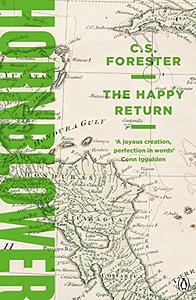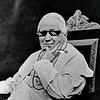You need to sign in or sign up before continuing.
Take a photo of a barcode or cover
adventurous
funny
inspiring
medium-paced
Plot or Character Driven:
A mix
Strong character development:
Yes
Loveable characters:
Yes
Diverse cast of characters:
Complicated
Flaws of characters a main focus:
Yes
A great little romp with a surprisingly emotional ending.
The first Hornblower book I've read, it lives up to its billing as a fast read, a naval action-adventure from the age of sail. I look forward to more books in the series.
I'm a real Hornblower fan. This is the first Hornblower book Forester wrote but not the earliest in Hornblower's career. When I first read them I did it according to Hornblower's chronology, which I would recommend to others.
Hornblower's adventures in the Pacific and off the coast of South America. The action is tense, and the constant flip-flops of fortune really bring how how precarious communications and treaties were at the time. I found the romance a bit annoying to read, as Horatio's total inability to love his wife galls me a bit. The lack of divorce at the time is one of those hard cultural differences for me to grasp--though to be honest, even if it were easy to divorce his wife, Hornblower's sense of duty and obligation would probably keep him there anyway. Let's just say it's a conflict of which a little bit goes a long way for me, and it was too much the centerpiece of this book to make for an enjoyable read at times.
adventurous
tense
fast-paced
Plot or Character Driven:
Plot
Strong character development:
Complicated
Loveable characters:
Complicated
Diverse cast of characters:
Complicated
Flaws of characters a main focus:
Yes
currently reading a collection of the hornblower books after being intrigued by some really excellent transformative work inspired by the property; absolutely fascinated to see how and where the cumulative story progresses. horatio's voice hits loads of what i consider my favourite/the most compelling tropes for me -- crippling anxiety, heavy masking, trauma and responsibility and the kind of self-hating catastrophic imagination that leads to exceptionally unreliable narration -- but his level of hatred spills over into vicious racism, imperialism, and misogyny that may be roughly period accurate but can be VERY difficult to read. 1937 british novelist does 1808 british naval captain in the colonised carribean and it SHOWS. outside of that: the work is fast-paced, plot-heavy, and unafraid to confront the violence of war; the prose style isn't poetic but it is agile and the characters are vivid, compelling, and deeply flawed. i don't honestly know if i could recommend the books to anyone without a laundry list of caveats, but despite how many times i had to put it down, i still picked it back up because i had to know what the hell happened next.
Graphic: Death, Misogyny, Physical abuse, Racial slurs, Racism, Sexism, Violence, Xenophobia, Blood, Colonisation, War, Injury/Injury detail, Classism
Moderate: Ableism, Body shaming, Bullying, Confinement, Fatphobia, Infidelity, Mental illness, Schizophrenia/Psychosis , Alcohol
Minor: Child death, Medical content
I loved these as a kid and reading the Hornblower-inspired space opera Honor Harrington inspired me to read them again. Hornblower Is a good man tormented by doubts of his own self-worth who strives to be better than his own opinions of himself. In this story he has adventures off the coast of the Spanish main, helping rebels, fighting rebels, and begrudgingly rescuing a lady in distress. Heave to!
adventurous
medium-paced
Plot or Character Driven:
Character
Strong character development:
No
Loveable characters:
No
Diverse cast of characters:
No
Flaws of characters a main focus:
No
---------------------------
Read over 10 Days
---------------------------
Style....................................0.75
Pacing...............................0.5
Enjoyment......................0.5
Memorability................0.5
Recommendability..0.5
Plot.......................................0.75
Characters.....................0.5
Setting...............................0.75
Originality........................0.75
Resolution........................0.75
Clarity................................NA
Focus..................................NA
Objectivity/Bias..........NA
Sources.............................NA
My Agreement..............NA
---------------------------
10/10 Score: 6.25
5/5 Score: 3.25
Gut rating: 3
Read over 10 Days
---------------------------
Style....................................0.75
Pacing...............................0.5
Enjoyment......................0.5
Memorability................0.5
Recommendability..0.5
Plot.......................................0.75
Characters.....................0.5
Setting...............................0.75
Originality........................0.75
Resolution........................0.75
Clarity................................NA
Focus..................................NA
Objectivity/Bias..........NA
Sources.............................NA
My Agreement..............NA
---------------------------
10/10 Score: 6.25
5/5 Score: 3.25
Gut rating: 3
Chronologically the 6th in CS Forester Hornblower series, this was actually the first published (in 1937!), and so is a pretty good 'jumping-on' point for those unfamiliar with the character or novels.
Sometimes also known as 'The Happy Return', this sees Hornblower commanding the frigate Lydia on it's mission into Spanish held waters: a mission that will involve forming an alliance with an insane Spanish landowner, encounters with the 50-gun Spanish ship-of-the-line Natividad, storms at sea, and (the married) Hornblower's first encounter with (the fictional) Lady Barbara Wellesley, the sister of the future Duke of Wellington.
A quick reading and thoroughly enjoyable read it is!
Sometimes also known as 'The Happy Return', this sees Hornblower commanding the frigate Lydia on it's mission into Spanish held waters: a mission that will involve forming an alliance with an insane Spanish landowner, encounters with the 50-gun Spanish ship-of-the-line Natividad, storms at sea, and (the married) Hornblower's first encounter with (the fictional) Lady Barbara Wellesley, the sister of the future Duke of Wellington.
A quick reading and thoroughly enjoyable read it is!
adventurous
tense
Hell the fuck yes. This is Hornblower babyy.
Reading these books in chronological order, I was vaguely worried this one would be massively different or a step-down in quality from the other Hornblower books since it was written first, but these fears were mostly unfounded! Certainly, this Hornblower is a bit different from the one I'm used to (surprisingly darker), and the beginning few chapters make it clear that this was meant to be read as an introductory first book than the sixth one it would eventually become, but Forester did a good job at writing the prequels so that this feels like plausible character development as Hornblower matures into middle-age. He's still got all his iconic neurosis, which is what I'm here for. The only huge, noticeable inconsistency is Hornblower's relationship with Bush restarting, but Hornblower/Bush are so weird and repressed around each other that them becoming more distant as Hornblower advances in rank also felt like plausible development.
I will admit, the first part of this book had me a bit unsure if I would love it... besides those overly-introductory first few chapters, when the plot and villain were introduced, I found it to be a bit too over-the-top (I was still entertained because these books are my guilty pleasure but I was uhhh skeptical about the quality). But once the ridiculous El Supremo is out of the way and the plot becomes focused on defeating the Natividad, then this book becomes more realistic (but still entertaining). The second battle with the Natividad is some incredibly engaging action, but also—appropriately—horrifically brutal. And the ending of this novel takes a surprisingly reflective turn, reaffirming this as a really, really good series about introversion and shyness more than anything else. I've said it before, but I'll say it again: Horatio Hornblower is one of the best characters ever written.
What makes this book unique from other Hornblower books and other naval fiction more generally is the emphasis on gendered dynamics in a military setting. In an acknowledgment of both history and the genre's erasure of women's roles on shipboard life, Forester forces a female character into the centre of the plot and has her play vital roles as many of our hero's beliefs are challenged and shattered. I like that Barbara is a complex character in her own right, like Hornblower, with extreme flaws, yet still sympathetic. It's not a perfect depiction of course- Forester was not exactly a progressive guy and there's still some occasional misogynistic remarks/attitudes—not to mention overt racial biases and stereotyping—in this book that clearly date this to the 1930s, but for the 1930s I thought it wasn't too bad. There's enough self-deprecating humour to make the Britishness tolerable, at least. While the other Hornblower books I read have a more neutral narrator and feel more timeless as a result, this one is very difficult to divorce from the interwar backdrop it was written in, which is neither a strength nor a weakness, I suppose. It actually ended up offering a kind of fascinating insight into the perceptions regarding women's roles and conscription laws leading up to WWII.
I'm not sure if I'll ever completely vibe with Forester's writing style. He's no stylistic genius and I think he writes too fast-paced and to-the-point for my tastes as I prefer my historical fiction to have more details for immersion's sake. But there's also nothing inherently wrong about simple writing and I think it serves the type of psychological/inward-focused book Forester is writing good enough. It reminded me a bit of Hemingway, actually, and lo and behold it turns out Hemingway apparently loved this book.
Reading these books in chronological order, I was vaguely worried this one would be massively different or a step-down in quality from the other Hornblower books since it was written first, but these fears were mostly unfounded! Certainly, this Hornblower is a bit different from the one I'm used to (surprisingly darker), and the beginning few chapters make it clear that this was meant to be read as an introductory first book than the sixth one it would eventually become, but Forester did a good job at writing the prequels so that this feels like plausible character development as Hornblower matures into middle-age. He's still got all his iconic neurosis, which is what I'm here for. The only huge, noticeable inconsistency is Hornblower's relationship with Bush restarting, but Hornblower/Bush are so weird and repressed around each other that them becoming more distant as Hornblower advances in rank also felt like plausible development.
I will admit, the first part of this book had me a bit unsure if I would love it... besides those overly-introductory first few chapters, when the plot and villain were introduced, I found it to be a bit too over-the-top (I was still entertained because these books are my guilty pleasure but I was uhhh skeptical about the quality). But once the ridiculous El Supremo is out of the way and the plot becomes focused on defeating the Natividad, then this book becomes more realistic (but still entertaining). The second battle with the Natividad is some incredibly engaging action, but also—appropriately—horrifically brutal. And the ending of this novel takes a surprisingly reflective turn, reaffirming this as a really, really good series about introversion and shyness more than anything else. I've said it before, but I'll say it again: Horatio Hornblower is one of the best characters ever written.
What makes this book unique from other Hornblower books and other naval fiction more generally is the emphasis on gendered dynamics in a military setting. In an acknowledgment of both history and the genre's erasure of women's roles on shipboard life, Forester forces a female character into the centre of the plot and has her play vital roles as many of our hero's beliefs are challenged and shattered. I like that Barbara is a complex character in her own right, like Hornblower, with extreme flaws, yet still sympathetic. It's not a perfect depiction of course- Forester was not exactly a progressive guy and there's still some occasional misogynistic remarks/attitudes—not to mention overt racial biases and stereotyping—in this book that clearly date this to the 1930s, but for the 1930s I thought it wasn't too bad. There's enough self-deprecating humour to make the Britishness tolerable, at least. While the other Hornblower books I read have a more neutral narrator and feel more timeless as a result, this one is very difficult to divorce from the interwar backdrop it was written in, which is neither a strength nor a weakness, I suppose. It actually ended up offering a kind of fascinating insight into the perceptions regarding women's roles and conscription laws leading up to WWII.
I'm not sure if I'll ever completely vibe with Forester's writing style. He's no stylistic genius and I think he writes too fast-paced and to-the-point for my tastes as I prefer my historical fiction to have more details for immersion's sake. But there's also nothing inherently wrong about simple writing and I think it serves the type of psychological/inward-focused book Forester is writing good enough. It reminded me a bit of Hemingway, actually, and lo and behold it turns out Hemingway apparently loved this book.
adventurous
challenging
emotional
funny
informative
inspiring
sad
tense
medium-paced





